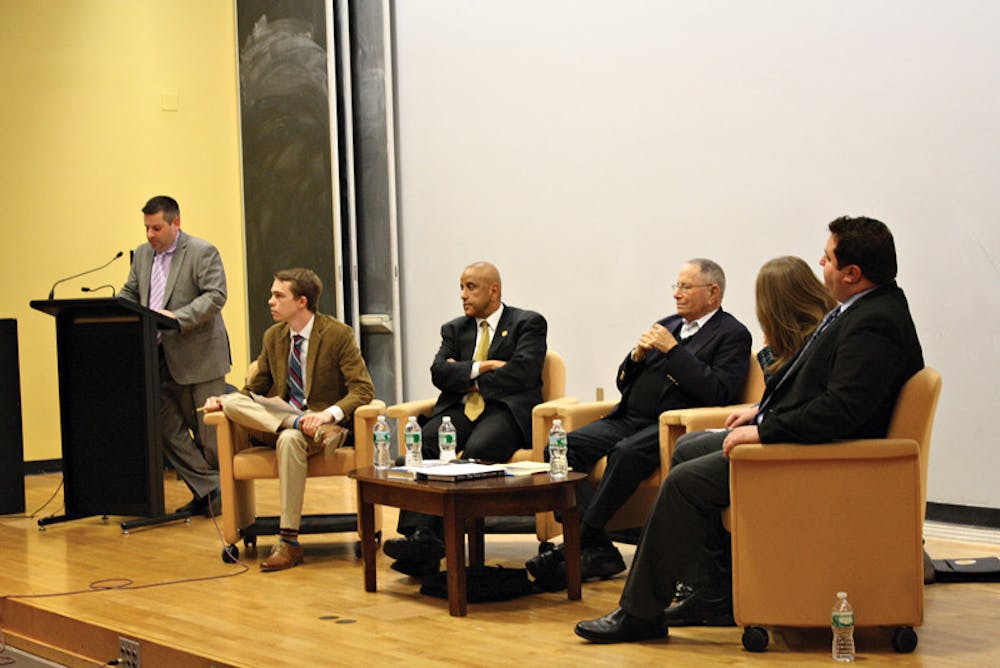The “huge explosion” of the American prison population is connected with the fact that 56 percent of federal offenders are in prison for nonviolent drug offenses, said Diego Arene-Morley ’16, president of Students for Sensible Drug Policy, during the community forum “Regulating Marijuana in Rhode Island: A Public Health and Safety Approach” held at List Art Center Nov. 18.
Many of these nonviolent drug offenders are African-American, he said, adding that “there are more African-American men imprisoned in the criminal justice system than there were enslaved in the 1850s.”
Organized by Brown’s chapter of SSDP, the forum featured a wide range of panelists, including state Sen. Joshua Miller, D-Cranston, Warwick, President of the National Association for the Advancement of Colored People’s Providence branch James Vincent and retired Providence police officer Elizabeth Comery.
The experts discussed the benefits of state legalization of marijuana, while also acknowledging some of its potential consequences. Panelists also discussed the possibility of regulating marijuana in a similar manner as alcohol,
“Health costs associated with alcohol are eight times greater than those associated with marijuana,” said Mason Tvert, the director of communications at the Marijuana Policy Project, a national organization aimed at making marijuana legal.
“In an ideal world, no one would want to use marijuana or alcohol. But the fact remains that in the real world, these substances are out there,” he said. “By making alcohol legal and marijuana not, we are incentivizing the use of a more harmful substance.”
Among other topics, the experts focused on the discrepancy in incarceration rates across races, the health risk posed by marijuana compared to other substances, the opportunities for tax revenue and the risks involved in marijuana legalization.
“Facts are sometimes manipulated by people who are afraid that youthful attraction to marijuana will mushroom with de-legalization,” said David Lewis, founder of the University’s Center for Alcohol and Addiction Studies. “But somehow the research misses the point that under the current criminal justice system, the mechanisms we use do very little to contain use of marijuana or the problems that result from it.”
Problems that result from marijuana use drive mass incarceration, which is destroying many communities, Vincent said. “So yes, (marijuana) is a gateway drug — a gateway to broken lives and broken families,” he said.
As a former police officer, Comery contributed a law enforcement perspective to the conversation. “Many of the calls that we receive at night are disturbances. And 99.99 percent of the time, the root problem of these disturbances was alcohol. But I’ve never gotten a call where two pot-heads were beating each other up,” she said.
Comery also mentioned how the War on Drugs has distracted the police from more serious crimes.
“The clearance rate for homicides in this country has plummeted since the War on Drugs has started,” Comery said. In 1980, the national homicide clearance rate — the percentage of reported homicides that are solved — was 72 percent, and in 2008, it decreased to 68 percent, she added. “We’re filling up our prisons with nonviolent drug users and we’re not getting the murderers.”
Peter Friedmann, professor of health services, policy and practice, said he thought the forum was too one-sided. “They’re downplaying the risks associated with marijuana usage. There’s clear evidence that there is an increase in traffic fatalities while high, increases in lung cancer and long-term lung dysfunction associated with marijuana,” he said.
“Yes, we already have alcohol, and we already have tobacco. And yes, alcohol and cigarettes may cause a lot more harm. But three wrongs do not make a right,” Friedmann said.
Pat Oglesby, former member of the U.S. Senate Finance Committee, spoke about the potential revenue associated with marijuana legalization. Oglesby founded the Center for New Revenue, a North Carolina nonprofit which focuses on marijuana taxation.
“The average person asks, ‘What’s in it for me?’ The answer may be that there is some revenue coming in from marijuana tax that would make the state better, cut certain taxes and pay down debt,” Oglesby said.
Michelle McKenzie, a public health researcher and mother, said “I feel strongly that we have to protect our young more. The fact is that youth have access to marijuana through the illegal market,” adding that “I think we will have more control when we legalize and can thus regulate marijuana.”
The forum was moderated by Jared Moffat ’13, director of Regulate Rhode Island, a “coalition of citizens and organizations committed to ending the failed policy of marijuana prohibition,” according to its website.
The audience was primarily composed of Providence residents, with a few Brown students and professors in attendance as well.
John McGrath, a Providence resident, said he thought the forum “did a very good job bringing the level of discussion to a mature, fact-based level of discourse.”
Beth Cosby ’17 enjoyed the discussion. “It’s really interesting to see the different perspectives each of the panel members brought, and I like that they discussed both the public health perspective and the civil liberties perspective,” she said.
A previous version of this article misattributed a quote. “Yes, we already have alcohol, and we already have tobacco. And yes, alcohol and cigarettes may cause a lot more harm. But three wrongs do not make a right,” was said by Peter Friedmann, professor of health services, policy and practice, not Providence resident John McGrath. The Herald regrets the error.

ADVERTISEMENT




